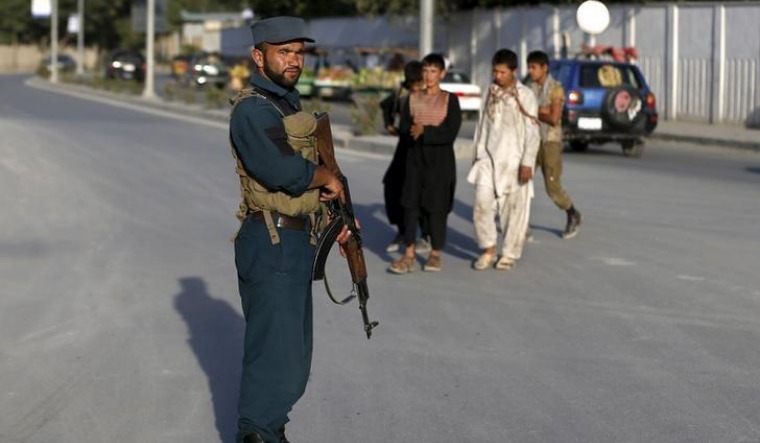Afghanistan is on the brink of a civil war. Taliban fighters are steadily gaining ground. Any hope of an agreement with the government is fading fast. To add to the already volatile situation in the country, President Joe Biden, on Thursday, announced that American troops will leave by August 31—much ahead of the deadline—making it clear that America will no longer be involved in the affairs of the country.
“We did not go to Afghanistan to nation-build, and it is the right and responsibility of the Afghan people alone to decide their future and how they want to run their country," Biden said. The speech—the longest that the President made on Afghanistan—has left no illusions that America knows that the future of Afghanistan is with the Taliban. Biden said, “The only way there is going to be peace and security in Afghanistan is if they work out a modus vivendi with the Taliban...And the likelihood there is going to be one unified government in Afghanistan, controlling the whole country, is highly unlikely."
This scenario—one that has been evident—leaves India with very limited options. Especially, as India has no leverage with the Taliban. Any government led by the Taliban—which has deep links with Pakistan—will make Delhi uncomfortable. Estimates claim that the Taliban now controls 80 per cent of the territory.
Wary of the Taliban, India is reported to have reached out to elements in the Taliban quietly. But the ministry of external affairs has strongly denied any contact. Despite a reach-out, if it did happen, any government with the Taliban in the driving seat is not likely to be a natural ally or dependable ally for the South Block, especially because of the Pakistan connection. Prime Minister Narendra Modi has his task cut out.
The security situation is worsening. Taliban attacked Qala-e Nau, capital of the Badghis province, capturing police headquarters and spy agencies. June has been the bloodiest month since the conflict began. According to TOLOnews, 638 military personnel and civilians were also killed in Taliban attacks during this period, and 1,060 others were wounded in the month. The Afghan National Security and Defense Forces (ANDSF) have eliminated 6,000 Taliban fighters in the month, according to TOLOnews. As the American pullout continues, ANDSF will play a vital role in pushing the Taliban fighters at bay.
The forces might be engaged in the fighting on the ground—which they have been doing for the past year—but they still depend on air power from the US. The Taliban attempt at capturing Qala-e-Nau, northwestern Badghis, earlier in the week illustrated how vital that airport was. As fighting intensified, air power pushed back the fighters.
However, with Biden’s speech that emphasised that America will no longer play any role, the question is if ANDSAF depend on continued support from the US? Afghan President Ashraf Ghani appeared confident. “What we are witnessing is one of the most complicated stages of the transition," he said in a speech in Kabul, adding, “Legitimacy is ours; God is with us."
The fluidity, or its gravity, is not lost on India. “We are, however, carefully monitoring the deteriorating security situation in Afghanistan and its implications on the safety and security of Indian nationals in Afghanistan. Our response will be calibrated accordingly,’’ said Arindam Bagchi, the MEA spokesperson, at the weekly media briefing earlier this week.
India has also been involved in trying to develop consensus with allies in the region. In the recent months, there has been a flurry of meetings to try and get a consensus within the region, and build on connectivity.
Jaishankar, meanwhile, made a surprise visit to Tehran on his way to Moscow on Wednesday with an eye on Kabul. “They also discussed the evolving situation in Afghanistan and expressed concerns over the deteriorating security there,’’ said Bagchi. “Both sides also discussed joint connectivity initiatives in the region, including the International North South Transport Corridor (INSTC) and Chabahar Port.”
READ MORE: Why India should talk to the Taliban
The visit of the external affairs minister came at a time when Iran was holding talks in which an Afghan government delegation met Taliban leaders in Tehran. With the Taliban winning territories closer to Iran, Tehran will be keen to ensure peace, and quickly. The focus on Chabahar is to ensure India has a connection to Afghanistan that doesn’t depend on Pakistan—vital for India to keep a footprint in the region.
Jaishankar’s meeting in Russia too will have an Afghanistan focus. As India's top diplomat engages with Russian diplomats, a delegation of the Taliban is in Moscow. This is another attempt at bringing the government and the Taliban on the same page.
However, India is not banking on the Taliban-moderate scenario, and is keeping other options open. Especially significant is the visit of Uzbek warlord Abdul Rashid Dostum, who had been at the heart of the resistance against the Taliban, to new Delhi in September 2020. Dostum had met Jaishankar, foreign secretary Harsh Vardhan Shringla during his visit to Delhi. The powerful former Northern Alliance commander Ismail Khan, who commanded Herat, was in Delhi in April, suggesting that India is rediscovering old non-Pashtun friends and keeping options open.
Perhaps, India’s greatest weapon is its commitment to development. Indian investment in the country stands at $3 billion—a paltry sum in terms of money, but each project has won goodwill many times over. “I think, in all the 34 Afghan provinces, we have development projects of some kind,’’ said Jaishankar speaking at the Raisina Dialogue. “I think in the last 20 years, we have demonstrated through our actions and projects on the ground, what our real feelings are for Afghanistan.”
The Taliban will want a piece of this development pie.





